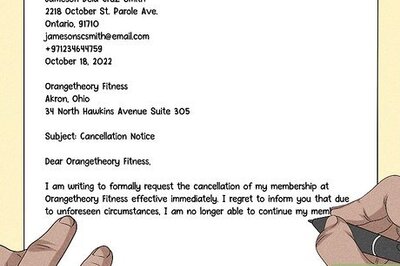
views
Trying Quick Remedies

Rinse your eyes out with cold water whenever they feel irritated. Wash your hands thoroughly to remove any irritants that may be on your skin. Cup your hands and fill them with cold water from your sink. Keep your eyes open and splash the water onto your face to rinse out any pollen or allergens. Continue applying cold water until you feel relief before patting your face dry with a soft, clean towel. Don’t rub your eyes if you haven't washed your hands since you could make the irritation worse.

Hold a cold compress against your eye for extended relief. Wet a soft, clean washcloth underneath cold water and wring it out as much as possible so it isn’t dripping wet. Tilt your head back and close your eyes as you set the compress on your face. Press the compress against your eyes with your palms and hold it in place for 5–10 minutes. Pat your face dry with a clean towel when you’re finished to help remove any irritants on your face. If possible, boil water and let it cool in your fridge completely before wetting the compress to ensure it doesn't contain any bacteria or contaminants. Don’t leave your eyes open while applying the compress.Variation: You can put ice cubes in a plastic bag and wrap a towel around it if you don’t want to use a damp towel.

Take a shower if you’ve been outside, if possible. As you walk around outside, you may get pollen on your clothes, skin, and hair, which can cause your eyes to itch even when you go indoors. Use face wash around your eyes as well as shampoo and body wash to clean your entire body so you don’t get itchy eyes later on in the day. Make sure to wash and change your clothes when you get back home since they may also have irritants stuck to them. Showering and changing into clean clothes before you go to bed may also help to combat hay fever symptoms. Brush your hair before you go to bed if you don’t wash it. This will help to remove allergens from your hair.
Using Over-the-Counter and Prescription Medicine

Try anti-allergy eye drops whenever your eyes are red or itchy. Wash and dry your hands thoroughly to ensure there isn’t any pollen on them. Shake the bottle of eye drops and remove the cap. Tilt your head back, pull your bottom eyelid down with your finger, and look straight up. Squeeze 1 drop into your eye and slowly close your eyelid to spread it around. Repeat the process in your other eye. You can buy anti-allergy eye drops from local drugstores or pharmacies without a prescription. Avoid touching the dropper against your eye since it could contaminate the bottle. Don’t close your eyes tightly, or else the eye drops may squeeze out. You can also spray a saline rinse into your eyes to clean them. Saline rinses are available at most drugstores or pharmacies.Tip: If possible, start using eye drops about 1 week before you start feeling itchiness from hay fever since it may take some time to feel relief.

Take an oral antihistamine if you have other seasonal allergy symptoms. Antihistamines help reduce swelling and itchiness caused by allergens, so check what’s available from your local pharmacy. Take 1 dose of antihistamines, such as 10 mg of Claritin or Zyrtec every day, with a glass of water and wait about 30 minutes for it to start taking effect. If your eyes still feel itchy after the first dose wears off, try taking another dose. If you have severe allergies, talk to your doctor about prescription-strength antihistamines since they’re stronger. Antihistamines can make you feel drowsy, so be cautious while driving or operating machinery after taking them. Follow the dosage instructions on the package closely since too much could cause nausea or vomiting.

Talk to your doctor about steroids drops. If you’ve tried regular over-the-counter allergy medications and eye drops and you don’t get any relief, make an appointment with a doctor or ophthalmologist and ask if steroid nasal spray is right for you. For example, Flonase or Nasacort may help to relieve any allergy symptoms that are affecting your eyes and nose.

Ask about immunotherapy if you have severe allergic reactions. If you have trouble breathing, severe congestion, or intense sinus pain, your doctor may suggest immunotherapy with an allergist. Go to each immunotherapy session so they can give you a sublingual tablet or injections with trace amounts of pollen or allergens. Your body will slowly develop an immunity to the irritants so you don’t have as severe of symptoms during peak hay fever season. You usually will not be given immunotherapy if your only symptoms are itchy eyes. Immunotherapy usually begins in the winter and lasts for about 3 months. Immunotherapy varies from person to person, so it may not be as effective of treatment for you.
Preventing Itchy Eyes

Avoid going outside when there’s a high pollen count. Check the weather each day and pay attention to the pollen levels in your area. When there are between 9.7–12 grams of pollen per cubic meter, stay indoors to prevent pollen from getting in your eyes and causing irritation. If you need to go outside, put on glasses that wrap completely around your eyes so you stay protected from allergens. If you have other allergic conditions to hay fever, try wearing a face mask so you don’t breathe in any irritants. Change clothes after going outside since they may have pollen stuck on them. Peak pollen times occur in the early morning and evening, so you may not experience as much itchiness if you go out during midday.

Keep windows and doors closed as much as possible. Keep your home closed throughout the day so pollen doesn’t blow into your home. Make sure all the windows and doors have a tight seal to keep other allergens outside. Use air conditioning or fans if you need to keep your home cool. If you need to open doors or windows, close them as soon as you can. If you’re driving, leave your windows up and turn your vehicle’s air conditioning so it doesn’t pull in outside air.Tip: If you have a window air conditioner, make sure it has an air filter to reduce the amount of pollen coming into your home.

Put on wraparound glasses instead of wearing contacts. Avoid putting contacts in while you’re experiencing eye irritation since they could make your eyes feel itchier. Opt for glasses that wrap around your face and fit tightly against your eyes. That way, less pollen and irritants will float into your eyes so they don’t get red or itchy throughout the day. If you don’t need glasses normally, look for wraparound sunglasses to wear when you go outside where irritation is most likely to occur.Tip: If you need to wear contacts, opt for a daily disposable variety so pollen or irritants don’t build up on the surface.

Clean your home with a damp dusting rag or wet mop. Avoid using dry dusters or brooms when you clean since they could send allergens into the air and irritate your eyes. Wet a cleaning rag with a dusting spray and wipe down surfaces at least once or twice a week to keep them clean. When you need to clean your floors, dip a mop in cleaning solution and wring it out before using it. Be sure to rinse and wash any cleaning materials after you use them to get rid of the allergens completely. You can also use mops that use a wet cleaning pad to pick up dust and pollen. Change the sheets on your bed once per week and your pillowcase every other day to prevent allergens from building up on them.

Use an air purifier with a HEPA filter to get rid of pollen. Look for a fan or air purifier from your local home goods store and ensure that it has a HEPA filter, which removes small allergens and irritants from the air. Set the air purifier up in the room where you spend the most time, such as a living room or bedroom, and run it during peak allergy season. Be sure to read the instructions carefully so you know when to check or replace the filter. Air purifiers usually cost between $25–100 USD, but it may vary on the size and efficiency of the machine.
Eliminate common allergenic foods from your diet for 2-4 weeks. While following an elimination diet may not cure your hay fever, it may lessen your symptoms. Try removing common problem foods from your diet for 2-4 weeks to see if it helps your symptoms, then reintroduce these foods 1 at a time and wait a few days to see if your symptoms return. If they do, you may be allergic to or intolerant of that particular food. Some foods you may want to eliminate include: Citrus fruits Dairy products, such as milk, yogurt, and cheese Eggs Gluten-containing foods, such as bread, cookies, pretzels, and pasta Soy Shellfish Peanuts and tree nuts Beef Corn and foods that contain corn, such as cereal and tortilla chips
Try taking supplements to combat hay fever symptoms. Supplements may help to lessen symptoms of hay fever, especially if you are deficient in one or more essential nutrients. Try taking a multivitamin that gives you no more than 100% of your daily recommended intake of each of the following vitamins. Check the label to be sure that the supplement contains: Vitamin C Vitamin D Vitamin E Zinc
Manage stress levels with exercise, rest, and relaxation techniques. Having high stress levels may make your hay fever symptoms worse, so it’s important to keep your stress levels under control. You can do this by making some simple lifestyle changes, such as: Exercising for 30 minutes on most days of the week, such as by walking, swimming, dancing, or riding a bike Getting adequate rest, such as by sleeping between 7-9 hours every night and going to bed and waking up at approximately the same time each day Using relaxation techniques, such as deep breathing, yoga, and meditation




















Comments
0 comment